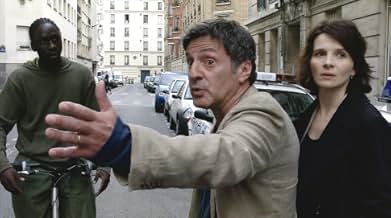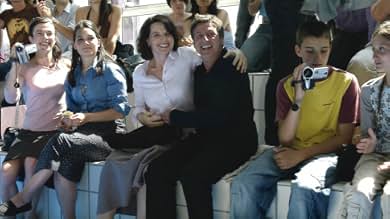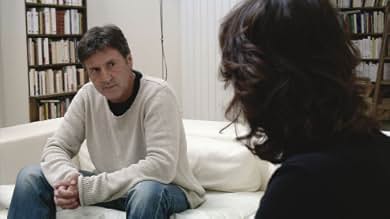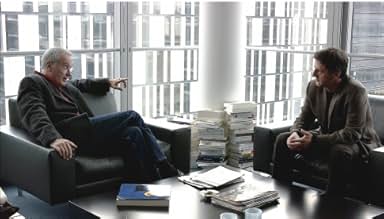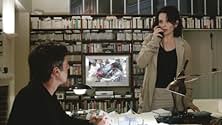Un matrimonio se ve aterrorizado por una serie de videos de vigilancia que les están dejando en el porche delantero.Un matrimonio se ve aterrorizado por una serie de videos de vigilancia que les están dejando en el porche delantero.Un matrimonio se ve aterrorizado por una serie de videos de vigilancia que les están dejando en el porche delantero.
- Dirección
- Guión
- Reparto principal
- Premios
- 29 premios y 37 nominaciones en total
Reseñas destacadas
Michael Haneke's film begins as a clinical, psychological and social study of a respectable individual in European society. It ends as a study of a larger contemporary European segment of its population. It reminds one of the early works of Fassbinderonly Haneke's production values are more sophisticated. The camera becomes a charactera major one at that. This reminds the viewer that he is watching cinema at several junctures and that s/he is part of the communication/entertainment process. It makes you constantly ponder if the cinema you are watching is providing truth or lies (or something in between) 24 frames per second. The fixed-medium range shots that opens and closes the film indicate the view and mood of the director--clinical, somewhat distanced and unshaken by the story he unfolds. We also notice that what we are seeing, might not be what we think we are seeing. Antonioni did this to us in "Blow up" several decades ago.
After the screening at the on-going Dubai film festival, I was amused at the director carefully distancing himself from a situation where he could have resolved the issues-he prefers to leave it to the viewer to do so. In a way the entertainment continues after the screening if you choose to reflect on what you saw.
At the obvious level, it is a study of colonial guilt of Europe and race relations. At a deeper level, it probes complacency and bourgeois temperaments of the financially secure classes in society. Escape from reality comes from closing curtains, shutting off the outside world and consuming sleeping tablets. At another level, the film explores the attitudes of three distinct generations towards social relationships.
Haneke uses graphic shocking violent scenes to jolt the audiences when they least expect it. He seems to enjoy the process. His strength is not in his cinema (Kubrick, in comparison, was brilliant at this game). Hanneke's strength lies elsewhereeliciting fascinating performances from his cast. Daniel Auteuil, Julliette Binoche, Maurice Benichou and Annie Girardot were simply fascinating to watch.
The strength of the film lies in the subject that will disturb anyone. Many of us have something in our past that we wish to hide or not discuss. Yet there is a conscience in us that nags us to believe that there was a witness to that wrongdoing--a witness who cannot be buttonholed. It is this psychological fact that makes the film tick, much less its cinematic flourish.
After the screening at the on-going Dubai film festival, I was amused at the director carefully distancing himself from a situation where he could have resolved the issues-he prefers to leave it to the viewer to do so. In a way the entertainment continues after the screening if you choose to reflect on what you saw.
At the obvious level, it is a study of colonial guilt of Europe and race relations. At a deeper level, it probes complacency and bourgeois temperaments of the financially secure classes in society. Escape from reality comes from closing curtains, shutting off the outside world and consuming sleeping tablets. At another level, the film explores the attitudes of three distinct generations towards social relationships.
Haneke uses graphic shocking violent scenes to jolt the audiences when they least expect it. He seems to enjoy the process. His strength is not in his cinema (Kubrick, in comparison, was brilliant at this game). Hanneke's strength lies elsewhereeliciting fascinating performances from his cast. Daniel Auteuil, Julliette Binoche, Maurice Benichou and Annie Girardot were simply fascinating to watch.
The strength of the film lies in the subject that will disturb anyone. Many of us have something in our past that we wish to hide or not discuss. Yet there is a conscience in us that nags us to believe that there was a witness to that wrongdoing--a witness who cannot be buttonholed. It is this psychological fact that makes the film tick, much less its cinematic flourish.
In Paris, Georges Laurent (Daniel Auteuil) is a famous host of a literary talk show on TV, who lives in a comfortable house with his wife Anne (Juliette Binoche) and their teenager son Pierrot (Lester Makedonsky). When Georges and Anne receives videotapes of surveillance of their private life and weird and gore childlike drawings, they go to the police, but they do not get any protection since there is not a clear menace to the Laurent family. When Georges follows a clue in one of the tapes that shows his childhood home, he meets his former adopted brother, the Algerian Majid (Maurice Bénichou) and accuses him of sending the tapes. Meanwhile, through glimpses of Georges' nightmares, his lies due to his jealous relationship with his foster brother are disclosed.
"Caché" is definitely an inconclusive movie, open to the most different interpretations, and this obvious based on the number of very intelligent and helpful discussions in IMDb Message Board. I am a fan of Michael Haneke, and I believe this is his intention, to promote a wide discussion about his movie at the same time he uses the historical moment in 1961 of the war between France and Alger. The last scene with Majid's son at Pierrot's school indicating that the may know each other just increases the possibilities. Anyway, the tense and realistic story of guilty and paranoia is very original and without the usual clichés of Hollywood movies. My vote is seven.
Title (Brazil): "Caché"
"Caché" is definitely an inconclusive movie, open to the most different interpretations, and this obvious based on the number of very intelligent and helpful discussions in IMDb Message Board. I am a fan of Michael Haneke, and I believe this is his intention, to promote a wide discussion about his movie at the same time he uses the historical moment in 1961 of the war between France and Alger. The last scene with Majid's son at Pierrot's school indicating that the may know each other just increases the possibilities. Anyway, the tense and realistic story of guilty and paranoia is very original and without the usual clichés of Hollywood movies. My vote is seven.
Title (Brazil): "Caché"
Greetings again from the darkness. French films have a tradition of being filmed intimately, almost in a voyeuristic manner. Writer/Director Michael Haneke takes it a step further with a story about a family being watched. The idea is pretty creepy as Daniel Auteuil and Juliette Binoche have videos dropped on their doorstep showing the almost total nonaction occurring right outside their front door. This puts quite a strain on their already passionless relationship.
The joy of a suspense story is assembling the clues and deciding what is and what is not vital to solving the mystery. Haneke does an admirable job of tossing clues and false trails on the viewer. The general consensus seems to be that if you somehow miss the last shot of the film, you can't solve it. In fact, that final shot merely reinforces what we have already been shown.
The blending of voyeurism, terrorism and revenge causes much stress for the two leads. Auteuil is solid in his role, but the lovely Ms. Binoche really shines in her much more emphatic turn as the wife and mother who begins to unravel as the men in her life seem to turn on her. Watching for details such as the TV newscasts, facial expressions and the timing of the appearance and disappearance of key characters will easily allow the viewer to solve the mystery, but it does not take away from the tension the situation creates.
This is a pretty solid thriller, but not in the class of Francois Ozon's "Swimming Pool" from a couple of years ago. Of course the topicality of technology makes "Cache" a bit more relevant at the moment.
The joy of a suspense story is assembling the clues and deciding what is and what is not vital to solving the mystery. Haneke does an admirable job of tossing clues and false trails on the viewer. The general consensus seems to be that if you somehow miss the last shot of the film, you can't solve it. In fact, that final shot merely reinforces what we have already been shown.
The blending of voyeurism, terrorism and revenge causes much stress for the two leads. Auteuil is solid in his role, but the lovely Ms. Binoche really shines in her much more emphatic turn as the wife and mother who begins to unravel as the men in her life seem to turn on her. Watching for details such as the TV newscasts, facial expressions and the timing of the appearance and disappearance of key characters will easily allow the viewer to solve the mystery, but it does not take away from the tension the situation creates.
This is a pretty solid thriller, but not in the class of Francois Ozon's "Swimming Pool" from a couple of years ago. Of course the topicality of technology makes "Cache" a bit more relevant at the moment.
The title of this engrossing and disturbing new Haneke film is ironic. At the end of the film, Georges Laurent (Daniel Auteuil) tells his wife Anne (Juliette Binoche) that he will be "caché," hidden, and he takes off his clothes, closes the curtains, and buries himself in bed. It's afternoon. But he will be exposed, as before. "Caché" is about how you can't hide. Auteuil, an actor who naturally looks worried and put-upon, and Binoche, who has a vulnerable and frightened look, play a privileged couple whose son Pierrot (Lester Makedonsky) at twelve is a star swimmer. Georges has a literary TV program (like "Le Bouillon de la Culture"), which, in France, makes him a star. They have a beautiful house in an elegant suburb of Paris. (His childhood home, we learn, was a substantial farm.) Beyond all that are the poor outskirts on the periphery of the French capital, the slums, the projects, the "banlieux," with their Arabs and blacks, French society's underprivileged and mistreated, unemployed and ignored, a population ready to explode into revolt -- as it very dramatically did in November 2005.
Like Haneke's previous "Code Unknown," "Caché" is primarily about alienation and connection. This sounds theoretical and intellectual, but the uncompromising Austrian who now makes his films in French always finds a deep emotional core in his people, in this case a core of the most infinite desperation in both perpetrator and victim. "Code Unknown" focused on chance meetings. "Caché" moves in closer to home, to this family whose peace is shattered and to another family that has never had peace. As the film begins the foreground family begins to receive increasingly menacing videos left on their doorstep that show they are being watched. Georges thinks he knows who it is.
"Caché" blends urban angst with the primal horror of Greek tragedy. What goes around comes around. For what he has explained was his starting point for the film, Haneke elliptically refers within it to the story of hundreds of Algerians the French cast into the Seine in 1961, a story recently unearthed and hitherto largely ignored. Within the film's foreground we discover that as a youth Georges himself betrayed an Algerian playmate in a way that effectively ruined his life. But the events that unfold are full of mystery and foreboding, and the relation between the Algerian, Majid (Maurice Bénichou), and Georges' current terror and disquiet largely remains uncertain. Is this a thriller? Maybe: it has a thriller's progressive unease, the suspense and pulse -- up to the end, anyway -- of a good whodunit. But Haneke, a great director in fine form here, has produced something as intellectually challenging as it is emotionally troubling. He operates without the help of surging background music, jump cuts, or snappy chases. And as the final credits roll, the closing long shot (upon which we are again voyeurs, as when the film began), shows us that nothing is resolved. A highly original artist, Haneke continues to explore.
Seen during its Paris run in October 2005. Shown first in the US at the New York and Chicago Film Festivals in October 2005. Opening in NYC and LA (US release title "Hidden") December 2005, limited US release January 2006. This is a highly visual film and should be seen if possible on a big screen.
Like Haneke's previous "Code Unknown," "Caché" is primarily about alienation and connection. This sounds theoretical and intellectual, but the uncompromising Austrian who now makes his films in French always finds a deep emotional core in his people, in this case a core of the most infinite desperation in both perpetrator and victim. "Code Unknown" focused on chance meetings. "Caché" moves in closer to home, to this family whose peace is shattered and to another family that has never had peace. As the film begins the foreground family begins to receive increasingly menacing videos left on their doorstep that show they are being watched. Georges thinks he knows who it is.
"Caché" blends urban angst with the primal horror of Greek tragedy. What goes around comes around. For what he has explained was his starting point for the film, Haneke elliptically refers within it to the story of hundreds of Algerians the French cast into the Seine in 1961, a story recently unearthed and hitherto largely ignored. Within the film's foreground we discover that as a youth Georges himself betrayed an Algerian playmate in a way that effectively ruined his life. But the events that unfold are full of mystery and foreboding, and the relation between the Algerian, Majid (Maurice Bénichou), and Georges' current terror and disquiet largely remains uncertain. Is this a thriller? Maybe: it has a thriller's progressive unease, the suspense and pulse -- up to the end, anyway -- of a good whodunit. But Haneke, a great director in fine form here, has produced something as intellectually challenging as it is emotionally troubling. He operates without the help of surging background music, jump cuts, or snappy chases. And as the final credits roll, the closing long shot (upon which we are again voyeurs, as when the film began), shows us that nothing is resolved. A highly original artist, Haneke continues to explore.
Seen during its Paris run in October 2005. Shown first in the US at the New York and Chicago Film Festivals in October 2005. Opening in NYC and LA (US release title "Hidden") December 2005, limited US release January 2006. This is a highly visual film and should be seen if possible on a big screen.
If you've just seen "Cachê" and are still (understandably) in shock, not knowing whether you really liked it or not, let me ask you a few questions. Now, when was the last time a film:
a) had you glued to your seat as in "Caché", your eyes and neurones required to work in full gear from beginning to end, making it impossible to erase it out of your mind (instead of the instantly forgettable films you see every week), and actually making a second viewing almost compulsory?
b) posed such complex, multi-layered questions -- socio-political ones (the shameful, violent legacy of past and present imperialist nations, the manipulation of "reality" by the State and the media), existential ones (the racial, class and social prejudices that we all carry and have to fight within ourselves), and more prosaic ones, like trying to solve a complicated thriller? When were they so masterly interwoven?
c) made you aware that your explanation for the movie's most immediate, "practical" question (who's sending the tapes to Georges) will be influenced by your own background and prejudices?
d) had such a controversial and rich ending? (I could think of at least five possible denouements, even considering that I DID see the two boys -- q.v. the multiple theories about the ending in "Caché"'s message boards here in IMDb).
"Caché" is one of the few real masterpieces of the 2000s. The mix of socio-political comment with the thriller genre is not new, of course (you can go back at least to great German silent films by Lang, Murnau, Dieterle, Pabst). In 2005 alone, Cronenberg made the half-successful "A History of Violence", Spielberg the underachieved "Munich", Stephen Gaghan the overwrought "Syriana", Paul Haggis the soap-operatic "Crash". But Haneke asks us and gives us much more: he demands our ability to fill in the many important historical and political gaps, messes with our prejudices but respects our intelligence, and knows that a good part of us viewers are bored to death of being spoon-fed with one-digit I.Q. plots in mechanical thrillers inhabited by tired, phony "archetypes" of good x evil characters.
"Caché" is a monumental proof of Haneke's COMPLETE command of his craft. Artistic achievements like this are now SO rare in films that "Caché" feels like a happening -- a work of art that is mind-boggling, hypnotic and physically unnerving, ethically and esthetically disturbing, combining the sense of revelation and discomfort you get with the best political films with the braincells workout you get with the best thrillers.
As I left the theater, three masterpieces immediately came to my mind: Clouzot's "Le Corbeau" (a political statement disguised as a thriller and a probable inspiration for "Caché"), Antonioni's "The Passenger" (ditto, and also for the long, breathtaking, "open-meaning" last shot) and Resnais' "Marienbad" (the seminal film of multi-layered possible interpretations of "reality"). "Caché" stands tall on its own, reaffirming Haneke as one the top-5 working directors of the 2000s. Can't wait for his next film -- but while I do, I'll watch "Caché" one more time, and understand that hiding (Georges hiding his past and his feelings, nations hiding shameful parts of their history, Haneke hiding evidence, explanations and conclusions) can be a form of powerful revelation...and self-revelation.
a) had you glued to your seat as in "Caché", your eyes and neurones required to work in full gear from beginning to end, making it impossible to erase it out of your mind (instead of the instantly forgettable films you see every week), and actually making a second viewing almost compulsory?
b) posed such complex, multi-layered questions -- socio-political ones (the shameful, violent legacy of past and present imperialist nations, the manipulation of "reality" by the State and the media), existential ones (the racial, class and social prejudices that we all carry and have to fight within ourselves), and more prosaic ones, like trying to solve a complicated thriller? When were they so masterly interwoven?
c) made you aware that your explanation for the movie's most immediate, "practical" question (who's sending the tapes to Georges) will be influenced by your own background and prejudices?
d) had such a controversial and rich ending? (I could think of at least five possible denouements, even considering that I DID see the two boys -- q.v. the multiple theories about the ending in "Caché"'s message boards here in IMDb).
"Caché" is one of the few real masterpieces of the 2000s. The mix of socio-political comment with the thriller genre is not new, of course (you can go back at least to great German silent films by Lang, Murnau, Dieterle, Pabst). In 2005 alone, Cronenberg made the half-successful "A History of Violence", Spielberg the underachieved "Munich", Stephen Gaghan the overwrought "Syriana", Paul Haggis the soap-operatic "Crash". But Haneke asks us and gives us much more: he demands our ability to fill in the many important historical and political gaps, messes with our prejudices but respects our intelligence, and knows that a good part of us viewers are bored to death of being spoon-fed with one-digit I.Q. plots in mechanical thrillers inhabited by tired, phony "archetypes" of good x evil characters.
"Caché" is a monumental proof of Haneke's COMPLETE command of his craft. Artistic achievements like this are now SO rare in films that "Caché" feels like a happening -- a work of art that is mind-boggling, hypnotic and physically unnerving, ethically and esthetically disturbing, combining the sense of revelation and discomfort you get with the best political films with the braincells workout you get with the best thrillers.
As I left the theater, three masterpieces immediately came to my mind: Clouzot's "Le Corbeau" (a political statement disguised as a thriller and a probable inspiration for "Caché"), Antonioni's "The Passenger" (ditto, and also for the long, breathtaking, "open-meaning" last shot) and Resnais' "Marienbad" (the seminal film of multi-layered possible interpretations of "reality"). "Caché" stands tall on its own, reaffirming Haneke as one the top-5 working directors of the 2000s. Can't wait for his next film -- but while I do, I'll watch "Caché" one more time, and understand that hiding (Georges hiding his past and his feelings, nations hiding shameful parts of their history, Haneke hiding evidence, explanations and conclusions) can be a form of powerful revelation...and self-revelation.
¿Sabías que...?
- CuriosidadesThere is no music, save for the theme on George's show, and background music at Anne's publishing party.
- PifiasDuring the tape where Georges pulls up in his car and parks at night the headlights clearly cast a huge distinct shadow of the camera on the wall.
- Citas
Georges Laurent: Isn't it lonely, if you can't go out?
Georges's Mom: Why? Are you less lonely because you can sit in the garden? Do you feel less lonely in the metro than at home? Well then! Anyway, I have my family friend... with remote control. Whenever they annoy me, I just shut them up.
- Créditos adicionalesThe opening credits appear over a shot of the husband and wife's house, but they appear one by one and in rows. By the time the credits are over they are all shown together, much like they would on a poster or in the credits section of a movie trailer.
- ConexionesFeatured in Smagsdommerne: Episodio #3.13 (2006)
Selecciones populares
Inicia sesión para calificar y añadir a tu lista para recibir recomendaciones personalizadas
- How long is Caché?Con tecnología de Alexa
Detalles
- Fecha de lanzamiento
- Países de origen
- Sitio oficial
- Idioma
- Títulos en diferentes países
- Caché
- Localizaciones del rodaje
- 49 Rue Brillat-Savarin, Paris 13, París, Francia(Georges' house)
- Empresas productoras
- Ver más compañías en los créditos en IMDbPro
Taquilla
- Presupuesto
- 8.000.000 € (estimación)
- Recaudación en Estados Unidos y Canadá
- 3.647.381 US$
- Fin de semana de estreno en EE. UU. y Canadá
- 57.010 US$
- 25 dic 2005
- Recaudación en todo el mundo
- 16.197.824 US$
- Duración1 hora 57 minutos
- Color
- Mezcla de sonido
- Relación de aspecto
- 1.78 : 1
Contribuir a esta página
Sugerir un cambio o añadir el contenido que falta

